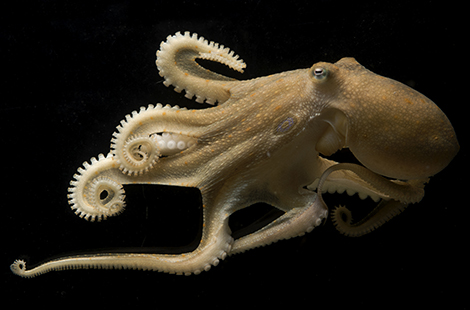Why scientists want to know octopuses as well as lab rats

A free daily email with the biggest news stories of the day – and the best features from TheWeek.com
You are now subscribed
Your newsletter sign-up was successful
Could octopuses become a new version of lab rats?
Scientists are investigating the possibility of using the "strange, almost alien" creatures as a way to study organisms with complex bodily functions and large brains, NPR reports. While much of scientific testing takes place on well-researched organisms like mice and fruit flies, the world of cephalopods (including octopuses, squids, and cuttlefish) could open up avenues of research into "the diversity of biology's solutions to problems," said Josh Rosenthal, a scientist at the Marine Biological Laboratory in Massachusetts.
The researchers at the MBL have thousands of specimens of various cephalopods, aiming to broaden our knowledge of their life cycles, genetics, and biological processes. This knowledge will serve as a baseline as the researchers continue to perform various experiments on the marine animals, so they can eventually be as well-known to us as laboratory mice.
The Week
Escape your echo chamber. Get the facts behind the news, plus analysis from multiple perspectives.

Sign up for The Week's Free Newsletters
From our morning news briefing to a weekly Good News Newsletter, get the best of The Week delivered directly to your inbox.
From our morning news briefing to a weekly Good News Newsletter, get the best of The Week delivered directly to your inbox.
The MBL is devoted to being on the front lines of cephalopod research, which means they're in "uncharted territory," NPR explained. But though they're invested in the science, they are serious about the ethics of their experiments, too. While the U.S. has no federal regulations on experimenting with nonvertebrates, the MBL takes ethics seriously, said Rosenthal. They hope to create a "one-of-a-kind policy for cephalopod research" that will ensure the wellbeing of the 3,000-odd creatures under their care.
Read more about the MBL's mission at NPR.
A free daily email with the biggest news stories of the day – and the best features from TheWeek.com
Shivani is the editorial assistant at TheWeek.com and has previously written for StreetEasy and Mic.com. A graduate of the physics and journalism departments at NYU, Shivani currently lives in Brooklyn and spends free time cooking, watching TV, and taking too many selfies.